Olympic Swimmer Dara Torres On Her 30-Year Journey with Asthma: 'It’s the Challenges That Motivate Me' (Exclusive)
“I realized I had to work hard to be good” she tells PEOPLE
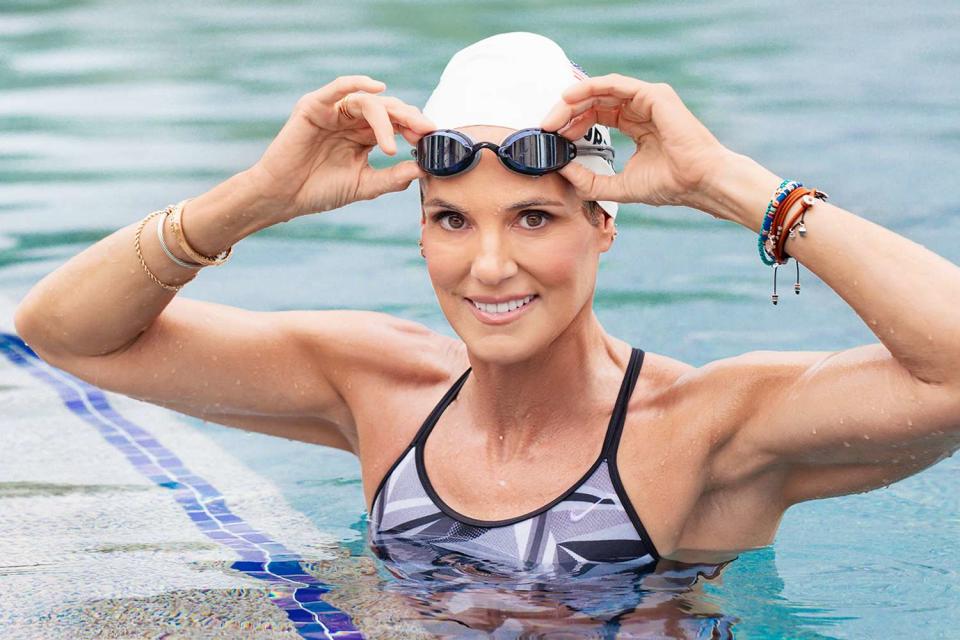
Olympic swimmer Dara Torres couldn’t have been more surprised when, at age 25, she first discovered she had asthma. The 12-time medalist had just won her second gold medal at the 1992 Summer Games in Barcelona—and she was back home in New York City on a run with a friend.
“I was wheezing a lot, and she asked if I had asthma,” recalls Torres. “I said, ‘I don’t know what you’re talking about.’ And she said, ‘Well, it sure sounds like you’re sick or you have asthma.’ ”
That prompted Torres to see a pulmonologist, who diagnosed her with asthma and prescribed a daily inhaler. For Torres, it was a game changer.
“I hadn’t ever really thought about it, I just knew that I would get tired doing things quickly,” she says. “But all of a sudden, I was finally able to finish my races.”
Torres is one of 27 million Americans with asthma, a chronic respiratory disease that leads to inflammation and a swelling of the airways — resulting in wheezing, coughing and pain or tightness in the chest. Triggers include allergens such as pet dander and dust, exercise and frigid air.
“Asthma symptoms can vary from occasional mild attacks to severe worsening [of the condition] and even, rarely, death,” says Dr. Abraham Sanders, a pulmonologist at New York-Presbyterian/Weill Cornell Medical Center and associate professor of clinical medicine at Weill Cornell. “Some people with severe asthma have daily symptoms and require regular medicine.”
For Torres, her asthma was triggered by the activity she loved the most. “My mom used to hear me wheezing all the time at swim meets but didn’t put two and two together,” says Torres, who lives in Fort Lauderdale and still takes a daily inhaler. “But ever since I was initially diagnosed, I got into a routine where I haven’t had any issues. And I still exercise every day. It’s a regimen that has really stuck with me and worked for 30 years.”
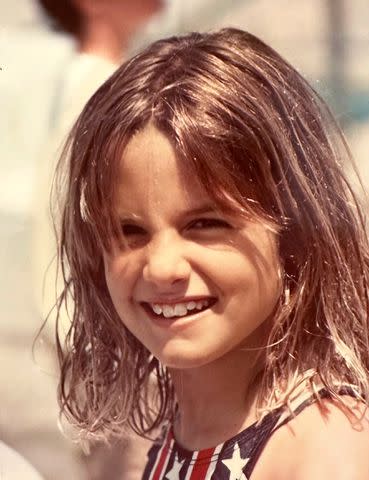
Torres grew up in Beverly Hills, the second youngest of six kids (including four older brothers) of Edwin Torres, a hotel owner (he died from colon cancer in 2006), and Marylu Kauder, a former model. Marylu encouraged her brood to try a range of sports—and signed Torres up for swimming lessons at age 7.
“My brothers were swimmers, and I wanted to do whatever they were doing,” recalls Torres. Her competitive spirit instantly kicked in (“It’s not just when I stand up on the starting blocks, it’s like in everything I do,” she says), and at age 14, she won the NCAA championship in the 50-meter freestyle event in Gainesville, Fla.—and never looked back. “Something really clicked,” she says. “I had a natural talent for the sport, but I also realized I really had to work hard to be good.”
During her junior year in high school, she started training for the 1984 Summer Olympics in Los Angeles, her hometown.
“I was beyond nervous,” says Torres, recalling the overwhelming crowds and excitement. “You don’t realize the magnitude until you look out into the stadium and you see, like, 10,000 people there. And you’re like, ‘Oh my God.’ ”
She struggled through her preliminary heats (“It was pretty bad”) but “pulled it together” to win gold as one leg of the Team USA 4 x 100 freestyle relay team.
“It’s really hard to explain the feeling of that medal around your neck and the national anthem playing,” says Torres, who was just 17. “You put in all the work, and only you can really appreciate that.”
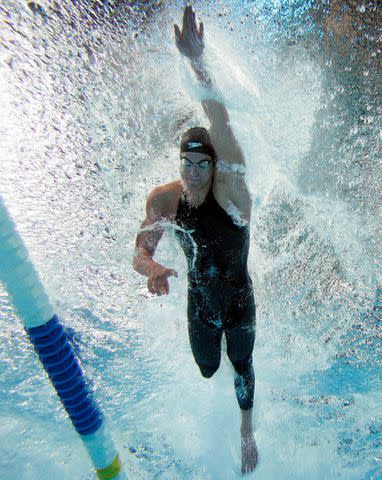
REUTERS/Christinne Muschi
Dara TorresNever miss a story — sign up for PEOPLE's free daily newsletter to stay up-to-date on the best of what PEOPLE has to offer, from celebrity news to compelling human interest stories.
Of course, what Torres didn’t know at the time was that with every stroke, she was also battling her asthma.
“I was known as a ‘drop-dead sprinter,’ ” she recalls, “where I would start out fast, and then at the end of my race, I would just die. I never had a full-blown attack, but I had very bad wheezing where I had to stop and couldn’t exercise anymore.”
She would inevitably persevere — figuring this was just the way things should be.
“You don’t really think about it when you’re younger. Every morning I’d wake up and cough some stuff up, but I was never sick. I didn’t really know what was going on. It’s just hard when you’re doing something so athletic, trying to catch your breath—and feeling like your lungs are closing in on you.”
And yet, her winning streak continued at the University of Florida, where she was an all-American in 28 different swimming events. But behind the scenes, the demands of training and competition were taking an even greater toll.
“My coach was pretty adamant about how he wanted us to look on the starting blocks and would weigh us every week,” she says. “And if we didn’t make weight, you had to do extra workouts, which was the last thing anyone wanted to do. . . . I was also putting pressure on myself,” adds Torres. “I’m a people pleaser, so I wanted my coach to be happy.”
She began bingeing and purging, and struggled with bulimia for five years before seeking help and seeing a psychiatrist. “I’m fine now, but for a few years after that I had a fear of foods,” she says. “That was the hardest thing for me to get over, that certain foods were triggers for me. It becomes an addiction, and it’s really hard to break out of that cycle.”
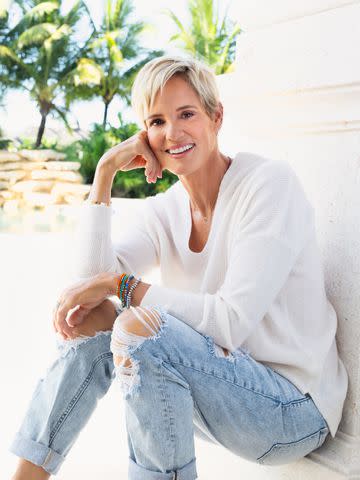
Related: Tony Hale Says His Asthma Can Be 'Very Scary': 'It Kept Me from Doing a Lot of Things'
She made the Seoul Olympic team in 1988, winning a silver and a bronze medal in the 4 x 100 medley and 4 x 100 freestyle relays, respectively, and went on to win gold again in Barcelona in 1992. A year later she was diagnosed with asthma and opted to take some time off, marrying sports producer Jeff Gowen (they divorced shortly after), and in 1994 she became the first athlete model featured in Sports Illustrated’s swimsuit issue.
“I retired because I was 25, there was no money in the sport and I had to start making a living,” says Torres.
Even so, her time away from the pool didn’t last long—and by 1999, at age 33, she was back in training for the 2000 Olympics in Sydney. Because she hadn’t swum competitively in nearly seven years her coach suggested she see an asthma specialist at Stanford University, who worked with swimmers and prescribed a combination of inhalers—one to take daily and one to use just before practice or a race.
“Looking back, I was a different swimmer,” says Torres, who won five medals in Sydney, including two golds — and became the oldest woman to win an Olympic medal in swimming. “I realized that I hadn’t been getting enough air for all those years.”
She stepped away from the sport again and married and divorced Israeli surgeon Itzhak Shasha. Two years later she started a family and gave birth to her daughter Tessa, now 17, whose dad is David Hoffman, a Florida-based reproductive endocrinologist.
“Being a mother is the greatest accomplishment of my life,” says Torres, who, at age 41, again decided to defy the odds and make one more history-making comeback at the Beijing Olympics in 2008.
“If Nolan Ryan could pitch a no-hitter at 44 years old, and Jack Nicklaus can win a Masters at 46, why couldn’t a 41-year-old mom make an Olympic team?” says Torres. “Why was there such a stigma against a woman doing that after having a kid?”
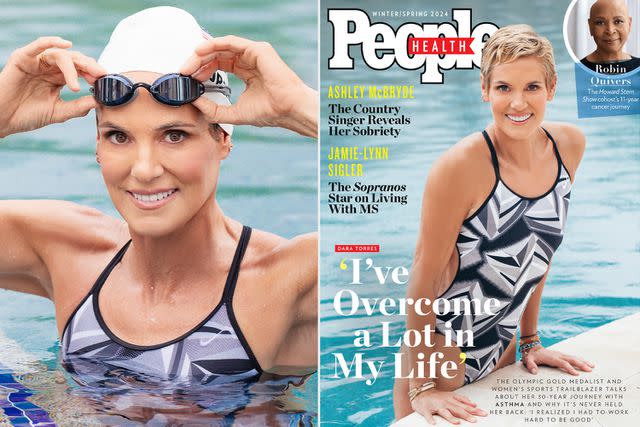
Related: 'Heartbroken' Parents Share Warning After 13-Year-Old Son Dies of Severe Asthma Attack
She successfully silenced the doubters — and then some — adding three more silver medals to her Olympic collection, falling just short in a final bid to win her first individual gold medal in the 50-meter freestyle by 0.01 of a second.
“I was really bummed,” admits Torres. “But on the plane home I thought about that race, and I was like, ‘You know what? I gave it everything I had. I didn’t lose the gold medal, I won a silver medal.’ ”
These days, Torres — who regularly gives motivational speeches — channels her competitiveness into a daily exercise regimen that ranges from TRX to boxing and running.
“When you’re an athlete, you’re trained to do the same thing over and over again,” she says. “So it’s nice to be able to mix things up to stay in shape.”
She generally avoids the pool and the sun (“I don’t want to have to worry about skin cancer”) but stays connected to women’s sports and swimming as an athlete ambassador for the USA Swimming Foundation and through regular appearances on the all-female CBS Sports Network show We Need to Talk.
Over the years she’s struggled with bronchial infections (“I’ve had to go on oxygen and get a nebulizer”), but overall she keeps her asthma in check with daily medication.
“I was undiagnosed for so many years,” she says, “and I’m so thankful that my friend just happened to mention asthma that day. I don’t think I ever would’ve gone to the doctor—and it’s made life so much better for me.”
PEOPLE Health can be found in select doctors' offices across the U.S. For more celebrity updates and the latest health news, pick up the latest issue of PEOPLE on newsstands or subscribe here.
For more People news, make sure to sign up for our newsletter!
Read the original article on People.


